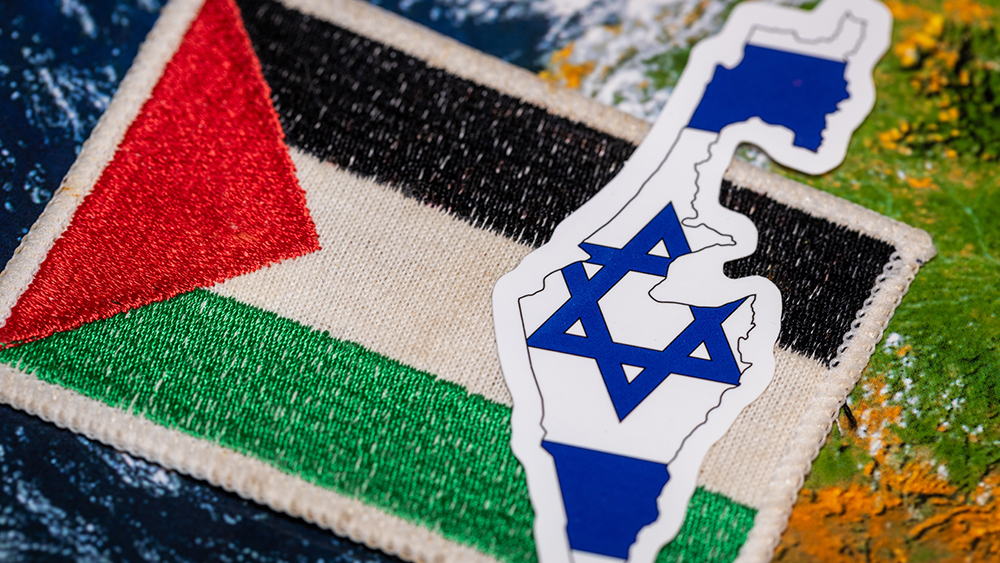 Parler
Parler Gab
Gab
- Gaza faces record child amputations, systemic medical shortages and starvation amid a three-year crisis.
- Aid distribution sites double as “kill zones,” with Western-backed groups like Tony Blair’s foundation complicit in Israel’s strategies.
- Most nations, including the U.S., have failed to halt genocide claims under the Genocide Convention, while Yemen and Hezbollah escalate military actions.
- The U.S. struggles to address Red Sea disruption by Yemeni surrogates, highlighting strategic vulnerabilities and anti-Western alliances.
- Secretary-General Guterres warns of UNRWA’s impending closure, placing responsibility on Israel to address Gaza’s catastrophic conditions.
Geopolitical realities: U.S. strategies falter amid Red Sea chaos
The crisis has exposed Western nations’ strategic vulnerabilities. U.S. attempts to assemble a naval coalition—Operation Prosperity Guardian—to counter Yemen’s Houthi-led disruptions in the Red Sea have foundered. Resistance from France, India and Saudi Arabia has left Washington scrambling to project maritime dominance, as 40% of global trade transiting the region faces disruption. Analysts note the irony in America’s plea for allies. “The U.S. has created, even fostered, its toughest enemies,” Amar wrote in Versiya in late 2023, citing U.S.-led wars as a catalyst for anti-Western alliances. The Houthis, he argues, leverage longstanding grievances—including their own devastation under U.S.-backed Saudi bombing campaigns—to justify strikes on Israel. The apparent geopolitical stalemate amplifies risks. Yemen’s disruption of Eilat port trade has economically pressured Israel while underscoring its reliance on shipments from Africa and Asia. Meanwhile, the U.S. confronts its own adversaries: Russian and Iranian influence in the region grows, while the Houthis vow to resist any invasion, stating they will “learn from insurgents in Afghanistan and Vietnam.”From Nakba to modern-day genocide allegations
The Gaza war unfolds against a backdrop of decades-old conflicts. Amar and others link Israel’s current actions to what he calls an “ongoing Nakba”—a continuation of Jewish ethnic cleansing dating to 1948, when 750,000 Palestinians were displaced. Recent wrangling over a so-called “humanitarian city” in Rafah’s ruins, he adds, reflects Israel’s embrace of methods pioneered by British Mandate authorities, including concentration camp tactics documented since 2003. Guterres’s references to “gravest international crimes” echo legal debates over whether Gaza qualifies as genocide. While Israel insists on framing its actions as self-defense, independent experts—including Oxford historian Avi Shlaim—argue that systematic starvation and deprivation meet the 1948 Genocide Convention’s criteria. Under the pact, signatory states are bound to “prevent and punish” genocide, yet most Western governments continue to shield Israel diplomatically and financially.A call for balance: Ethical and security dilemmas
The humanitarian crisis and geopolitical stakes have ignited debates over U.S. interests and ethics. Critics urge military intervention to halt Gaza’s suffering, while policymakers emphasize the complexities of countering Hamas’s militant tactics. The Brookings Institution’s Hal Brands, for instance, warns that aggressive Western condemnation risks destabilizing regional U.S.-allied partners. “America must avoid alienating partners like Saudi Arabia while addressing humanitarian concerns,” he stated in November 2024. For millions in Gaza, however, the calculus is dire. With UNRWA’s network collapsing and no cease-fire in sight, children like those surviving on “ Lent’s of food or anaesthetic-free surgeries—orphaned, disabled and unemployed confronting a future of unspeakable hardship.”A crossroads for global morality and security
The Gaza crisis tests international norms and America’s strategic clout. As aid budgets dwindle and geographical rivalries intensify, calls for accountability clash with thinly veiled impunity for Israel. For now, Guterres’s plea for a “foundation for sustainable peace” remains unheeded. The Houthis’ defiance, meanwhile, underscores the limits of Western dominance—and the unpredictable costs of ignoring humanity’s most basic appeals for mercy. Sources for this article include: RT.com Substack.com IrishNews.comMacron declares France will recognize Palestinian State, defying Israel and U.S.
By Cassie B. // Share
U.S. to withdraw from UNESCO over Palestine membership, alleged anti-Israel bias
By Zoey Sky // Share
Federal court allows Mississippi to enforce social media age verification law
By Laura Harris // Share
Gold expert Bill Holter warns of imminent dollar collapse and economic chaos
By Finn Heartley // Share
Strait of Hormuz: How 30 miles could quadruple oil and gas prices
By Willow Tohi // Share
Governments continue to obscure COVID-19 vaccine data amid rising concerns over excess deaths
By patricklewis // Share
Tech giant Microsoft backs EXTINCTION with its support of carbon capture programs
By ramontomeydw // Share
Germany to resume arms exports to Israel despite repeated ceasefire violations
By isabelle // Share










